Evolving Justice System, Evolving Legal Aid
New SLAC Chair Appointed and Review of Program Ordered
Don Morgan, the Chair of Saskatchewan Legal Aid Commission (SLAC), was replaced. Minister of Social Services, Janice MacKinnon, explained that the government was looking for a change in direction. Jane Lancaster, a 17-year SLAC staff lawyer, was named Acting Chair.
MacKinnon also named Roger Carter and Ian Wilson to undertake a pro bono publico review of the legal aid system in Saskatchewan. The review was to include an examination of the mandate and functions of SLAC.
Case Management System Work Underway at SLAC
After months of planning, the Saskatchewan Legal Aid Commission began work on the computerized Case Management System.
Training Computers Arrive at SLAC
Each Saskatchewan Legal Aid Commission Area Offices received a computer with a laser printer. The computers’ software included: DOS 5.0, Windows 3.0, and WordPerfect 5.1. The purpose of installing one computer per office was to allow staff the opportunity to get used to it and complete a tutorial called “Personal Computing.”
Provincial Court of Saskatchewan Holds First Sentencing Circle
Initiated by Judge Claude Fafard, the first sentencing circle within the jurisdiction of the Provincial Court of Saskatchewan was held in Sandy Bay. Sid Robinson of the Saskatchewan Legal Aid Commission’s Northern Area Office was the defense lawyer for the two youths who committed theft.
SLAC Staff Eager for Computerization
By the end of November 1992, Saskatchewan Legal Aid Commission installed an additional 37 computers, printers and peripheral equipment and six networks in Area Offices. Fifty-two staff members received training in WordPerfect, and many other employees took evening computer courses to improve their skills.
Computerized Data Entry Begins
The Saskatchewan Legal Aid Commission began production data entry for the 1992 - 1993 fiscal year at its Central office.
Saskatchewan Legal Aid Review Committee Report Finalized
The Honourable Pat Atkinson, the minister responsible for the Saskatchewan Legal Aid Commission, released the Saskatchewan Legal Aid Review Committee report to the public.
Roger Carter and Ian Wilson’s report made 31 recommendations in several categories, such as range of legal aid services, eligibility, services to Indigenous clients, access to legal aid in Northern Saskatchewan, quality of legal services provided, and governance of the organization.
Both Carter and Wilson recommended that more money be invested into legal aid.
SLAC Implements a Revised Private Bar Tariff
The Saskatchewan Legal Aid Commission implemented a revised private bar tariff designed to simplify the process of claiming reimbursement for services provided. The new tariff included two ways for lawyers to be paid: by fixed or hourly fees.
SLAC Offices Implement Case Management System
The first Saskatchewan Legal Aid Commission Area Office had the Case Management System installed. Data for the previous fiscal year was downloaded to give the office some historical information.
By June 1993, four more Area Offices had the system installed. All Area Offices had the Case Management System installed by September 1993.
SLAC Improves Delivery of Legal Services in Northern Saskatchewan
With Saskatchewan Justice, the Saskatchewan Legal Aid Commission revised the administration of the delivery of justice services in Northern Saskatchewan by transferring the administration of court points on the northwest side of the province to Meadow Lake. La Ronge continued to serve the north-central and northeast.
SLAC Develops First Information Systems Strategic Plan
Saskatchewan Legal Aid Commission’s first four-year Information Systems Strategic Plan was approved. The plan was developed by administrative staff and Legal Directors from each Area Office.
SLAC Develops an Affirmative Action Plan
The Saskatchewan Legal Aid Commission (SLAC) and its Joint Union Management Committee developed a comprehensive Affirmative Action Plan for the following target groups: Indigenous peoples, persons of a visible minority, persons with disabilities, and women in management and non-traditional roles. The plan was approved by the Saskatchewan Human Rights Commission in March 1994.
SLAC Employee New Provincial Ombudsman
Barb Tomkins, Legal Director of Saskatchewan Legal Aid Commission’s Estevan Area Office, was appointed Provincial Ombudsman.
SLAC Chair Appointed Queen's Counsel
Jane Lancaster, Chair of the Saskatchewan Legal Aid Commission, received Queen's Counsel designation.
New Eligibility Guidelines in Place for Legal Aid
Saskatchewan Legal Aid Commission Legal Directors and Commissioners recommended changes to the financial eligibility and coverage criteria of legal aid clients. Changes to the regulations were effective February 1995.
SLAC Contribution Policy in Place
The Saskatchewan Legal Aid Commission implemented a contribution policy as mandated under The Legal Aid Act and The Legal Aid Regulations, 1995.
Regina Legal Director Appointed Q.C.
Michael Ryan, Legal Director of the Regina City Area Office, was appointed Queen's Counsel.
Electronic Mail Pilot Project Launches at SLAC Offices
Three Area Offices of the Saskatchewan Legal Aid Commission begin an Electronic Mail (E-Mail) pilot project – Central, Regina City and Saskatoon City. The goal was to have electronic mail available throughout all offices in the 1996-1997 fiscal year.
SLAC Moves Back Under Saskatchewan Justice’s Umbrella
After 11 years under the Department of Social Services, the Saskatchewan Legal Aid Commission was transferred back to the Department of Justice.
More Computers Expected for SLAC Employees
The Law Foundation approved a grant of $121,400 to be used by the Saskatchewan Legal Aid Commission to purchase computers so that every employee has access to one. The grant also allowed for the remaining offices to be networked.
Two SLAC Lawyers Receive Q.C.
Norma Simm, Staff Lawyer in the Saskatoon City Area Office, and Sidney Robinson, Staff Lawyer at the Northern Area Office, received Queen's Counsel designations.
Child Support Calculated with a Push of a Button
The National Child Support Guidelines came into effect. Saskatchewan Legal Aid Commission employees were trained on a computerized program that calculated the amount of child support for clients.
New IT Strat Plan in Place
A new three-year Information Systems Strategic Plan was adopted by the Saskatchewan Legal Aid Commission. A management committee was established to review the plan on a regular basis.
Legal Aid Lawyer Appointed Q.C.
William MacIsaac, Staff Lawyer in the Regina City Area Office, was appointed Queen's Counsel.
Chinese Delegation Interested in SLAC Program
A delegation from China interested in establishing its own cost-effective legal aid program met with Saskatchewan Legal Aid Commission (SLAC) Chair Jane Lancaster to discuss the provincial staff-lawyer program. The Chinese group was first made aware of Saskatchewan’s legal aid program when Judge Bria Huculak, a former SLAC Staff Lawyer, traveled to China to participate in a criminal law reform conference
Justice Sharing Circle Includes SLAC Employees
In support of the Saskatchewan Legal Aid Commission’s goal of participating in restorative justice initiatives, the Meadow Lake Area Office participated in a Justice Sharing Circle. The office has maintained regular contact with local bands.
Backlog of Legal Aid Cases Blamed on Underfunding
CUPE Local 1949 president Kevin Glass publicly commented that chronic underfunding was putting the legal aid system in jeopardy. This remark followed the comments of Provincial Court Judge Eugene Lewchuk, who expressed concern about the backlog of legal aid cases. Glass noted that an increase in workload and a decrease in the number of staff to manage the workload were having an effect on the number of adjournments and overall service to which clients were entitled.
Legal Aid Employees Protest Workload and Lack of Support
Approximately 75 Saskatchewan Legal Aid Commission lawyers and support staff held an information picket outside of the Provincial Courthouse in Saskatoon in an attempt to raise awareness of their workloads, which many described as reaching crisis levels. Clients were reported to be waiting weeks to get an initial appointment with their assigned lawyer, and often faced adjournments in court.
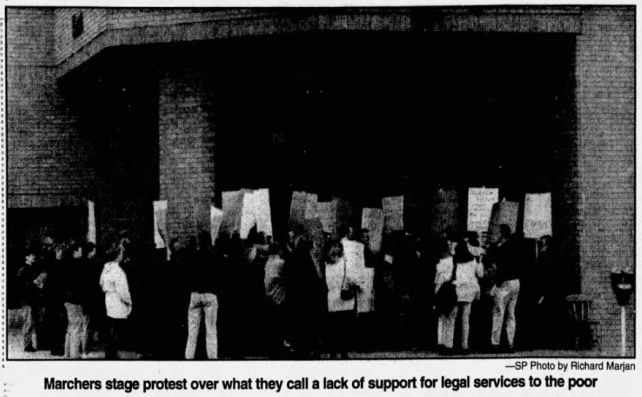

Saskatoon Star Phoenix, October 3, 1998
Saskatoon Star Phoenix, October 3, 1998
Provincial Court Judges Speak Out About Legal Aid Juggling Act
Several Provincial Court Judges made comments about the workload of legal aid lawyers and the effect it was having on the justice system as a whole.
“The authorities have to understand that because of the lack of resources for Legal Aid they are infringing on freedom rights of individuals.” – Judge Albert Lavoie
Several judges felt frustrated at watching legal aid lawyers struggle to serve clients appropriately due to intense and ever-increasing workloads. It was not uncommon for courtrooms to come to a halt while waiting on a legal aid lawyer simultaneously occupied in another courtroom.
SLAC Employees Receive Recognition for a Job Well Done
The first Employee Recognition Awards were presented during the Saskatchewan Legal Aid Commission’s staff conference. Recipients included Pat Reis (Staff Lawyer with the Regina Rural Area Office), Kearney Healy (Staff Lawyer with the Saskatoon City Area Office), and Rhonda Hoffman (Administrative Secretary with the Central Administration Office). This initiative was to acknowledge employees who showed exceptional service to clients, to the community, or in innovation and service to the Commission.
First SLAC Employee to Reach 25 Years of Service
Cheryl Boechler of the Saskatoon City Area Office became the first employee of the Saskatchewan Legal Aid Commission to reach the 25-year service milestone. She was recognized for her commitment to legal aid during the fall staff conference.
SLAC Employee Receives Q.C. Designation
Janice Lawrence from the Battlefords legal aid office was appointed Queen's Counsel.
Case Management Systems Receives an Upgrade
A redesigned Case Management System was implemented in each of the Saskatchewan Legal Aid Commission Area Offices. Many workstations were also converted to a Windows-based platform that was Y2K compliant, and new accounting and payroll software was introduced at Central Office.
Family Law Improvements in Northern Sask
The Saskatchewan Legal Aid Commission’s Meadow Lake Area Office established a northern family law circuit in order to provide a better levels of service to family law clients located north of Meadow Lake.
SLAC Chair Participates in Legal Aid Symposium in Czech Republic
Jane Lancaster, Saskatchewan Legal Aid Commission Chair, traveled to Prague where she participated in a symposium on legal aid. Czech Republic was transitioning its government institutions, including the justice system, to those based in democracy. Lancaster was able to provide Czech justice professionals with a detailed overview of how Saskatchewan’s legal aid system operates.
R v Gladue
In R v Gladue (1999) the Supreme Court of Canada directed the Courts to take into account the particular circumstances of Indigenous offenders in light of the over-incarceration of Indigenous people. This decision was reinforced by R v Ipeelee, 2012 SCC 13, stating that it is the judges’ statutory duty to take into account an Indigenous offender’s circumstances, no matter what offense was committed.
Legal Aid Employees Strike
After issuing a strike notice on May 4, 1999, the 111 employees of the Saskatchewan Legal Aid Commission (SLAC) who were members of CUPE Local 1949 voted on a new contract presented by the Commission. The legal aid employees were without a contract since September 30, 1997. In this round of bargaining, the two biggest concerns were workload and wages. In 1999, legal aid lawyers earned 24 percent less than non-unionized Crown prosecutors. The Commission offered to establish a labour-management committee to look into workload issues.
The workers voted 83% against the contract, sparking job action. New clients were no longer accepted at legal aid clinics, and private bar solicitors took over.
Jane Lancaster, SLAC Chair, offered bargaining over the weekend but was turned down. The Commission issued a memorandum to staff lawyers directing them to accept new applications, noting, “If you choose not to accept these applications, you may be subject to disciplinary action.”
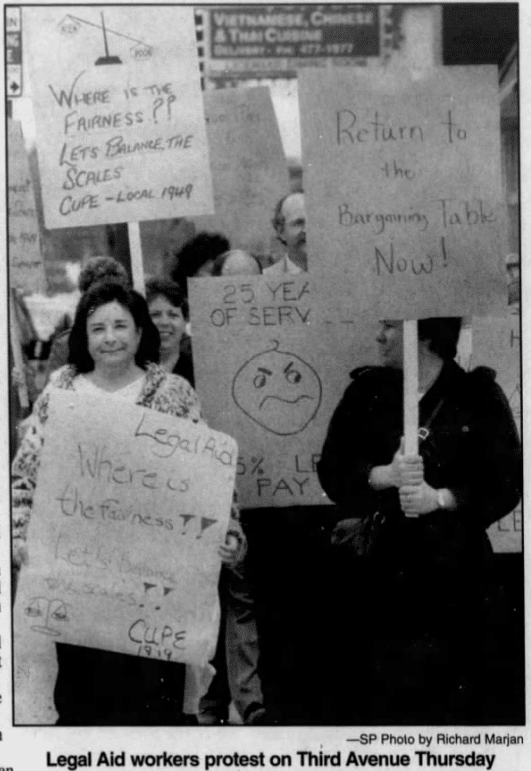

Saskatoon Star Phoenix, May 21, 1999
Saskatoon Star Phoenix, May 21, 1999
Lawyers Association and Citizens Group Support Legal Aid Employees
Members of the Saskatoon Criminal Defense Lawyers Association passed a motion to support legal aid workers by refusing to take any further legal aid work unless they are paid $125 an hour.
Saskatchewan Legal Aid Commission employees hosted a noon-hour bake sale with the goal of collecting nickels and dimes to help the Commission address their financial concerns. At the same time, members of the Citizens in Support of Legal Aid Workers held a protest outside of Premier Romanow’s Saskatoon office.


Saskatoon Star Phoenix, May 22, 1999
Saskatoon Star Phoenix, May 22, 1999
Deal is Reached Between Legal Aid Commission and CUPE
By early June of 1999, approximately 70 people per week were being turned away from the legal aid office in Saskatoon because of the strike action of Saskatchewan Legal Aid Commission (SLAC) employees.
A tentative deal was reached on June 4, meaning regular work schedules would resume by June 7. Wage parity with Crown prosecutors was not agreed to, but a pay equity plan was put into place.
SLAC CUPE members voted 70% in favour of the collective agreement.
SLAC Chair Travels to Vancouver for the International Legal Aid Conference
Jane Lancaster, Chair of the Saskatchewan Legal Aid Commission (SLAC), traveled to Vancouver to present at the International Legal Aid Conference. Her discussion focused on the staff-based model of legal aid. Attendees included representatives from legal aid plans in Australia, New Zealand, Holland, England, Ireland, Scotland, Norway and the United States.
SLAC Employees Organize Restorative Justice Seminar
Kathy Grier and Kearney Healy, two Saskatchewan Legal Aid Commission employees, organized a restorative justice seminar in Saskatoon, featuring criminologist Dr. Nils Christies from Denmark.
Rosten Report Released
The Report on the Strategic Needs Assessment for the Saskatchewan Legal Aid Commission (Rosten Report) was released. The objective of the report was to examine workload issues and resource requirements of SLAC.
The report noted that SLAC provides good value for the money it receives, and that more staff are required in order to meet the existing caseload demands. Recommendations of the report included:
- increase staffing;
- increase private bar tariff;
- increase the use of technology; and
- implement a control and measurement system for workload issues.
The Commission committed to adopt the recommendations.
SLAC Employee Receives Recognition Award
George Thurlow, Saskatchewan Legal Aid Commission staff lawyer in the Meadow Lake Area Office, received an Employee Recognition Award.
SLAC Celebrates 25 Years Serving the Citizens of Saskatchewan
The Saskatchewan Legal Aid Commission hosted a banquet in Saskatoon for current and former employees and Commissioners, community organizations and supporters of legal aid, and members of the justice system to celebrate its 25th anniversary. Approximately 300 people attended the event. The guest speaker was Roger Carter.
Funding for the celebration was provided by the Law Foundation of Saskatchewan. Throughout the year, each Area Office held a local celebration.
Legal Aid Director Appointed Q.C.
David Andrews, Legal Director of the Regina Rural Area Office, was appointed Q.C.
Judge Appoints Private Counsel Due to Legal Aid Backlog
A man charged with breaching a conditional sentence was told he could not meet with his legal aid lawyer for six months. Judge Carol Snell appointed a private lawyer to his case due to the unacceptable delay.
Employees of the Saskatchewan Legal Aid Commission were anticipating the upcoming budget with the hopes the backlogs would be addressed and the recommendations of the Rosten Report implemented.
Budget Increase Welcomed by SLAC
The Saskatchewan Legal Aid Commission received an 8% budget increase, which was anticipated to be used towards hiring more staff lawyers and reducing the five month waiting period faced by clients.
Lawyers were handling on average 346 files per year. The Rosten Report suggested hiring seven more lawyers to bring the caseload down to 301 annually.
Legal Aid Act Amended
Amendments to The Legal Aid Act were proclaimed. These changes removed the obligation of the Saskatchewan Legal Aid Commission (SLAC) to provide the choice of counsel to persons charged with offenses where the maximum sentence was life imprisonment. This supported SLAC’s commitment to provide competent legal counsel with expertise and experience to clients.
Additional amendments included:
- separating the roles of SLAC Chair and CEO;
- removal of residency requirements for private bar appointments;
- provision to asses contributions from former clients; and
- the composition of Commission members.
SLAC Employees Recognized with Awards
Employee Recognition Awards were bestowed upon Laura Lacoursiere, Director of Administration, and David Andrews, Q.C., Legal Director of Regina Rural Area Office for exceptional dedication to the vision and goals of the Saskatchewan Legal Aid Commission.
SLAC Raises Private Bar Tariff
Effective November 1, 2000, the private bar tariff of the Saskatchewan Legal Aid Commission was raised to $60 per hour.
SLAC Chair and CEO Roles Separated
Because of the proclaimed amendments to The Legal Aid Act that separated the roles of Chair and CEO, Jane Lancaster was hired as CEO for the Saskatchewan Legal Aid Commission (SLAC), and Barry Singer, Q.C. hired as Chair.
Saskatchewan Gets New Premier
With the retirement of premier Roy Romanow, Lorne Calvert was elected leader of the NDP and became the13th Premier of Saskatchewan.
Duty Counsel Project Launches in Regina
A Saskatchewan Legal Aid Commission Duty Counsel project (docket court) launched in Regina. Designated duty counsel became available for no cost to individuals requiring representation at an initial appearance and subsequent bail hearing.
Ontario, Manitoba, Alberta and British Columbia operated similar programs.
Implementation of a proposed Saskatoon project was expected for September 2001.
New SLAC Information Technology Plan in Place
The Saskatchewan Legal Aid Commission finalized a new three-year Information Technology Plan dedicated to the planning, acquisition, implementation and ongoing support and maintenance of its IT products and services.
Operation Help Launches in Saskatoon
The Saskatoon Police Service, EGADZ, Government of Saskatchewan Department of Social Services and Saskatchewan Legal Aid Commission combined forces to launch a program called Operation Help, designed to transition sex trade workers into a healthier lifestyle.
Still in place today, Operation Help is an alternative to the usual arrest and prosecution of sex workers. Instead, once arrested, the individual was connected with social services professionals, outreach workers, legal aid counsel, and elders to form a support network.
SLAC Hosts ALAP Annual Meeting
The Saskatchewan Legal Aid Commission hosted the Association of Legal Aid Plans of Canada at Wanuskewin Heritage Park from August 27 until August 29.
Duty Counsel Project Launches in Saskatoon
The Saskatchewan Legal Aid Commission (SLAC) launched a Duty Counsel project in Saskatoon that focused on expedited service to clients in custody. This was an extension of the Regina initiative that launched in April 2001.
The Aboriginal Court Workers continued to provide service to clients at first appearance, and the SLAC team represented accused persons at show cause hearings the following day
Legal Aid Layoffs to Accommodate More Focus on Family Law Services
The Saskatchewan Legal Aid Commission laid off five Saskatoon employees. CEO Jane Lancaster attributed the lay-offs to a realignment of resources to accommodate the provision of family law services.
Cree Court Launches in Northern Saskatchewan
Saskatchewan Justice launched a new circuit court in four Northern Saskatchewan communities (Big River, Pelican Narrows, Sandy Bay and Debden) that provided service in the Cree language. This allowed Cree-speaking residents a chance to communicate in their first language while in the courtroom. The Provincial Court Judge, Court Clerk/Translator, Crown Prosecutor and Legal Aid Counsel provided service, upon request, in Cree. The concept of Cree Court was originally proposed by Judge Claude Fafard, and was brought into existence with the help of Judge Gerald Morin. The Cree circuit handles criminal matters and child protection hearings.
The Saskatchewan Legal Aid Commission received federal funding for a 20-month pilot project to support the legal aid portion of the Cree Circuit Court.
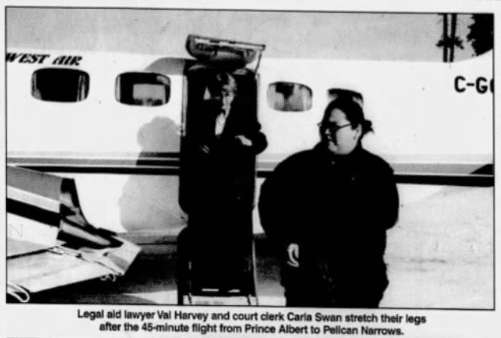

Saskatoon Star Phoenix, April 20, 2002
Saskatoon Star Phoenix, April 20, 2002
Melfort Legal Aid Lawyer Receives Q.C. Designation
Ross Green, Staff Lawyer in the Melfort Area Office, was appointed Queen's Counsel.
SLAC Receives Funding Boost
An additional $616,000 was allocated to the Saskatchewan Legal Aid Commission in the provincial government's budget release. CEO Jane Lancaster was pleased with the influx, and announced it would be applied to a family maintenance project designed to enhance legal services for financially challenged single mothers seeking child support.
SLAC Adopts First Strategic Plan
The Saskatchewan Legal Aid Commission finalized the first strategic plan to provide proactive direction to the organization for the next three years.
Law Foundation of Saskatchewan Announces Endowment Fund for Legal Aid
The Law Foundation of Saskatchewan established the $1.08 million Saskatchewan Legal Aid Endowment Fund Trust to assist in the Commission’s mandate to provide legal services in civil and criminal matters to persons who are financially unable to secure those services from their own resources. Annual income from the fund may be used for various initiatives including improving access to justice, enhancing professional development for staff and providing funds for research.
Indigenous Youths Over-represented in Justice System
Jane Lancaster was invited to speak to the Commission on First Nations and Metis Peoples and Justice Reform at the White Buffalo Youth Lodge. Lancaster’s presentation focused on the over-incarceration of young Indigenous people in the justice system. Approximately half of youths before the court were Indigenous. Sixty percent of youths on probation and 75% of youths in custody were Indigenous.
Lancaster said the Saskatchewan Legal Aid Commission was committed to working with Indigenous communities to shape legal services and employ individuals with Indigenous heritage.
CUPE Local 1949 Launches Publicity Campaign to Promote Legal Aid
Saskatchewan Legal Aid Week took place April 14 to 20, and as part of its activities CUPE Local 1949, representing more than 100 Saskatchewan Legal Aid Commission (SLAC) employees, launched a $50,000 advertising campaign. The goal of the campaign was to increase public support for the province’s legal aid program.
The campaign included billboards, leaflets and advertisements in various publications.
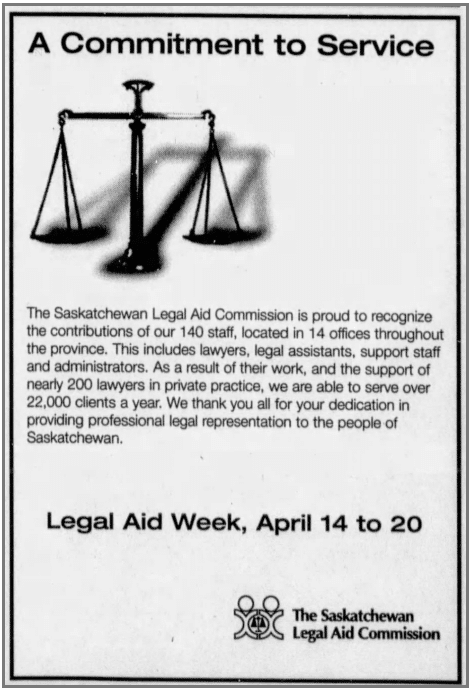

Regina Leader Post, April 19, 2003
Regina Leader Post, April 19, 2003
The Youth Criminal Justice Act in Effect
A statute covering the prosecution of youths for criminal offenses – The Youth Criminal Justice Act (YCJA) – came into effect, replacing The Young Offenders Act.
First Therapeutic Court in Saskatchewan Opens in North Battleford
The first therapeutic court in the province was established in North Battleford. The Battlefords Domestic Violence Treatment Options Court (DVTO) is a specialized court that offers a treatment option for those who are charged with domestic-related criminal offenses. The intensive treatment option allows individuals who are in an intimate relationship and are willing to take responsibility for their actions and who elect to enter a guilty plea, to complete a treatment for domestic violence. Typically, upon successful completion of the program, the participant will receive a reduced sentence. The program takes approximately six to eight months to complete with follow up reports on progress being provided to all participants.
A legal aid lawyer provides independent legal advice, appears on a regular basis with participants as they proceed through the program, and speaks at sentencing.
SLAC Legal Director Appointed Q.C.
Queen's Counsel was appointed to Barry Treacy, Legal Director of the Melfort Area Office.
Roger Carter Awarded Inaugural C. Willy Hodgson Award
The Law Society of Saskatchewan named Roger Carter the inaugural recipient of the newly established C. Willy Hodgson Award. This award is bestowed upon a person or group who demonstrates leadership, makes contributions and advances the legal professional in Saskatchewan or in Canada. Carter received this recognition for his work in establishing the Saskatchewan legal aid plan and the Native Law Centre.
SLAC Lawyer Appointed Q.C.
George Thurlow of the Saskatchewan Legal Aid Commission's Meadow Lake office was appointed Queen's Counsel.
Legal Aid Website Launched
A new website for the Saskatchewan Legal Aid Commission was launched (www.legalaid.sk.ca). This project was part of the Commission’s commitment to increase the access, visibility and awareness of legal aid, and to distribute public legal educational information about criminal law.
Also put into place was the use of telephone interpreter services, which provided interpreters in more than 140 languages.
SLAC Adopts New Strategic Plan
A new three-year strategic plan for the years 2005 to 2008 was adopted by the Saskatchewan Legal Aid Commission. The plan included a new vision and mission statement, and three “propositions for the future” which served as strategic goals.
SLAC Launches Staff Intranet
A staff intranet was launched for the employees of the Saskatchewan Legal Aid Commission.
Domestic Violence Court Opens in Saskatoon
A Domestic Violence Court opened in Saskatoon, based on the program that opened in North Battleford in 2003.
In its first year of operations, more than 900 people participated in the program. By 2017, there were approximately 150 per week.
“Telling Our Story” Campaign Launches
The Saskatchewan Legal Aid Commission launched an informational campaign called “Telling Our Story.” The purpose of this campaign was to provide clients with information in the areas of criminal law and with recognition of the oral traditions of Indigenous communities using the SLAC website, print ads, radio blasts and the distribution of a CD. SLAC partnered with actors from the Native Theatre Company, as well as Eagle Feather News, Missinippi Broadcasting, and CJWW.
The campaign included six client stories in English, Cree and Dene that recounted their experiences with legal aid services. The CDs were distributed to libraries, food banks, schools, and First Nations and Metis organizations throughout the province.
Queen's Counsel Designation Granted to SLAC Legal Director
James Struthers, Legal Director of the Saskatchewan Legal Aid Commission's South East Area Office, was appointed Queen's Counsel.
Province Provides Funds to Prevent Layoffs
The provincial government provided $212,000 to the Saskatchewan Legal Aid Commission (SLAC) as bridge funding to prevent layoffs while the organization awaited delayed federal funding. The federal funding arrangement expired March 31 and was not renewed timely. Seven employees had been given layoff notices as SLAC awaited the renewal, however the provincial funding allowed for the notices to be rescinded.
Standalone Criminal Law and Family Law Offices Created in Saskatoon
The Saskatchewan Legal Aid Commission announced the creation of standalone criminal law and family law offices in Saskatoon. This was done with the goal of improving services, particularly for family law clients. George Combe was the first Legal Director of the Criminal Law Office, and Kelly Soder the first Legal Director of the Family Law Office.
SLAC CEO Leaves Position
Jane Lancaster, the CEO of the Saskatchewan Legal Aid Commission, left her position. Lancaster was appointed to the Saskatchewan Automobile Injury Appeal Commission.
First Drug Treatment Court Opens in Regina
The Regina Provincial Court opened its first therapeutic court to address drug addictions as an underlying cause of criminal activity. In order to participate, the accused must accept responsibility and enter a guilty plea. If, after a one-month assessment, they are judged to be suitable participants, they will begin day treatment programs to address their addiction. The accused will appear regularly in court before the judge, and after one year they will be sentenced according to the level of success with which they completed the treatment program.
Two SLAC Legal Directors Appointed Q.C.
Two Legal Directors received Queen's Counsel appointments - Pamela Cuelenaere, Legal Director of the Prince Albert Area Office, and Donald Mullord, Legal Director of the Saskatoon Rural Area Office.
SLAC Boosts Private Bar Tariff
The Saskatchewan Legal Aid Commission’s revised private bar tariff became effective. The hourly rate increased from $60 per hour to $72.The last time the tariff was increased was in 2000, when SLAC changed the rates for preparation and court time to a flat $60 per hour from the previous $44 per hour for preparation time and $55 per hour for court time.
New CEO for Legal Aid
Alan Snell, Q.C. was appointed the new CEO of the Saskatchewan Legal Aid Commission. Snell worked as a staff lawyer from 1985 until 1988.
SLAC Adopts New IT Strategic Plan
A new three-year IT Strategic Plan was adopted by the Saskatchewan Legal Aid Commission. The plan provided for the refreshment and upgrading of hardware and software throughout the organization
Brad Wall Elected New Premier of Saskatchewan
Saskatchewan Party leader Brad Wall was elected Premier of Saskatchewan.
SLAC Legal Director Appointed Q.C.
Mervyn Shaw, Legal Director of the Moose Jaw Area Office, was given Queen's Counsel designation.
Legal Aid Pathfinders Project
The Saskatchewan Legal Aid Commission (SLAC) and the Saskatchewan Native Theatre Company partnered for a second time for a public awareness campaign. “Pathfinder: The Choice is Yours” was a province-wide prevention/education theatre production for schools and communities. The presentation used an interactive approach, such as having the protagonist “freeze” and giving the audience the opportunity to direct the storyline by voting on the choice to be made next. This allowed for them to see the consequences of their choices. Topics of the production included gang-related activities, underage drinking, sexual activity, shoplifting, armed robbery and more.
“Pathfinder: The Choice is Yours” was funded by the Law Foundation of Saskatchewan’s Legal Aid Endowment Fund Trust. The tour made 15 stops in the 13 communities where SLAC had an office. More than 1,500 people attended the production.
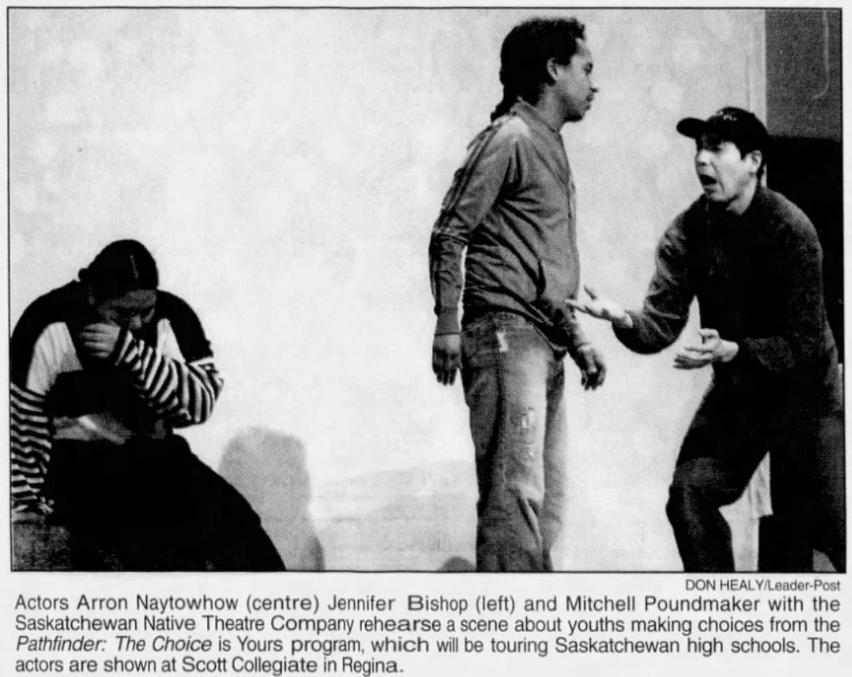

Regina Leader Post, March 6, 2008
Regina Leader Post, March 6, 2008
SLAC Approves New Five Year Strategic Plan
The Saskatchewan Legal Aid Commission approved a new five-year strategic plan to provide direction for the organization. The plan emphasized making legal aid services more client-centric.
Regina Domestic Violence Court Opens
The Domestic Violence Treatment Options Court was established in Regina. The court was designed to help both perpetrators of domestic violence and their victims. After successfully completing 20 weeks of counseling and programming, the participants receive a reduced sentence for their crime.
There were 400 participants in the first six months (75% were male).
SLAC to Defend all Youth Charged Under the YCJA
Bound by the Youth Criminal Justice Act (YCJA), courts are required to provide legal counsel to youths charged under the act if they need representation. Youths from low income backgrounds that met Saskatchewan Legal Aid Commission (SLAC) financial eligibility guidelines were assigned an SLAC lawyer, and youths who fell outside of SLAC’s guidelines were assigned to the Court Appointed Counsel (CAC) program. Both SLAC and CAC use public funds, so SLAC proposed an expansion of its scope to provide service to all youth charged in criminal matters.
The Legal Aid Regulations were amended by the provincial cabinet to remove the financial eligibility requirements for all individuals charged under The Youth Criminal Justice Act (YCJA).
New Name, New Logo for SLAC
As part of an endeavor to focus on the organization’s public perception, SLAC undertook a rebranding exercise in 2008. Staff were surveyed for a message they wanted communicated to the public. The prominent message was, “We are professional, we are experts, and we are experienced at what we do.”
A new logo was created to embody this key message, and the Commission approved a new name to better distinguish the Board of Commissioners and the organization: Legal Aid Saskatchewan.
New Information Management System Coming Soon
The Law Foundation of Saskatchewan approved a grant of $535,000 to the Saskatchewan Legal Aid Commission’s request to replace the organization’s Case Management System (CMS).
Two SLAC Lawyers Appointed Q.C.
Richard Meyer, Staff Lawyer with the Regina City Area Office, and Patrick Reis, Staff Lawyer with the Regina Rural Area Office, were given the Queen's Counsel designation.
Moose Jaw Drug Treatment Court Opens
Modeled after Regina’s Drug Treatment Court that opened in 2006, the Moose Jaw Drug Treatment Court opens. The court uses a collaborative model that includes judges, legal aid lawyers, Crown prosecutors, nurses, addiction counselors and other community workers.
LFS Endowment Fund Grows
The Law Foundation of Saskatchewan added another $1 million endowment to the trust fund for Legal Aid Saskatchewan.
Website Relaunch for LAS
The completion of Legal Aid Saskatchewan’s branding initiative signaled a renewed commitment to public perception and greater connections with the communities that Legal Aid serves. In keeping with that focus, LAS redeveloped and relaunched its website. The new site featured information for potential clients and for families of clients, as well as private bar lawyers. Potential clients were able to walk through the entire process online. Everything from eligibility, assessing the nature of the problem and detailing where to apply for services was at users fingertips. The site also listed similar legal organizations that could also provide help or information.
LAS Lawyer Receives Q.C.
Norman Bercovich, Legal Aid Saskatchewan Staff Lawyer in the Regina City Area Office, received Queen's Counsel designation.
LAS Lawyer Recipient of C. Willy Hodgson Award
At the Law Society of Saskatchewan’s Annual General Meeting, the Regina Drug Treatment Court was awarded the 2009 C. Willy Hodgson Award. Legal Aid Saskatchewan Staff Lawyer Jennifer Calderbank was one of the recipients of this honour, along with Judge Clifford Toth, Lorri Carlson, Linda Clements, Judie Birns, Kim Jones and Frankie Jordan.
The C. Willy Hodgson Award is presented to individuals or organizations who exemplify integrity, leadership and character and have made or are making outstanding contributions to advancing equity and diversity in legal education, the legal profession and/or the administration of justice in Saskatchewan or in Canada.
Q.C. Appointment for LAS Lawyer
The Queen's Counsel designation was given to Legal Aid Saskatchewan Staff Lawyer Maria Pappas from the Regina City Area Office.
LAS Launches the Legal Aid Information Network (LAIN)
The Legal Aid Information Network (LAIN) was designed specifically for Legal Aid Saskatchewan’s information management needs. The previous database had been in existence since 1993 and could not be evolved to meet the expanding needs of the organization. With funding from the Law Foundation of Saskatchewan, LAIN was created as an advanced reporting tool that could actively manage the electronic versions of client files.
LAS Legal Director Appointed Q.C.
Roseanne Newman, Legal Director for the Legal Aid Saskatchewan Meadow Lake Area Office, was appointed Queen's Counsel.
Information Technology Resourcing a Priority of LAS
All workstations, servers and backup devices were refreshed in every Legal Aid Saskatchewan Area Office. The first Information Technology System Support role was hired as an internal resource rather than outsourcing all IT needs.
LAS Hires New CEO
Craig Goebel took over as CEO of Legal Aid Saskatchewan after Allan Snell’s term was complete.
LAS Staff Lawyer Receives Award
At its June 2012 annual general meeting, the Law Society of Saskatchewan presented Legal Aid Saskatchewan Staff Lawyer Kearney Healy with the 2011 C. Willy Hodgson Award.
Financial Eligibility Guidelines Revised
The Legal Aid Saskatchewan financial eligibility levels for families with one, two or three children were increased, and a new category of single senior would be introduced in July 2014. The contribution policy was suspended.
LAS Staff Lawyer 5000th Person to Sign Rolls in Saskatchewan
Upon joining the Law Society of Saskatchewan from the Law Society of Newfoundland and Labrador, Silvia Suman became the 5,000 lawyer to sign the rolls in the province. At the time, Silvia was a staff lawyer with Legal Aid Saskatchewan's Prince Albert Area Office.
First Mental Health Court Held in Saskatoon and Regina
The Regina Provincial Court and Saskatoon Provincial Court held its first Mental Health Court. The court includes a judge, Crown prosecutor, defense counsel (legal aid lawyer) and a psychologist who completes a psychological profile and assessment for sentencing purposes. The Mental Health Court recognized a need to divert people with mental health problems away from traditional norms of the criminal justice system and connect them to community services.
LAS Lawyer Appointed Q.C.
Kearny Healy, Staff Lawyer with the Saskatoon City Area Office, was appointed Queen's Counsel.
Financial Eligibility Guidelines Revised Again
Legal Aid Saskatchewan released revised financial eligibility guidelines for applicants who are not on social or band assistance. The contribution policy was reactivated, which allows applicants whose income levels are slightly above the guidelines the ability to access LAS services for a fee of $40. The revisions also included a separate set of guidelines for northern residents.
Online Application for Legal Aid Available
Legal Aid Saskatchewan launched one of the world’s first online applications as part of its commitment to increasing access to people needing legal aid services. Approximately 500 applications were received online in the first year, with two-thirds of those applications deemed eligible for legal aid.
Rapid Remand Resolution Pilot Project Launches in Saskatoon
An early resolution project began as an attempt to reduce the number of remand inmates early in the week because of weekend arrests. Instead of sitting on remand for several days, a prosecutor, defense counsel (legal aid) and a community representative began meeting on Sunday mornings to discuss new arrests and have a plan in place for Monday morning. Within the first four months of the project, 70% of people were released or sentenced on their first appearance.
New Strategic Plan for Legal Aid
The Saskatchewan Legal Aid Commission approved a new three-year strategic plan for the organization.
LAS Legal Director Appointed Q.C.
Kimberly Earing, Legal Director of the Legal Aid Saskatchewan Northern Area Office, was appointed Queen's Counsel.
Moose Jaw Area Office Legal Director Recipient of C. Willy Hodgson Award
Mervyn Shaw Q.C., Legal Director for LAS' Moose Jaw Area Office, was named by the Law Society of Saskatchewan the 2017 recipient of the C. Willy Hodgson Award.
Scott Moe New Premier of Saskatchewan
Upon Brad Wall’s retirement, Scott Moe was elected leader of the Saskatchewan Party and became the province’s 14th Premier.
Gladue Rights Research Database Launches
Legal Aid Saskatchewan was looking for an innovative way to reduce the costs of acquiring and collating Gladue information, while still meeting its obligations as defense counsel to speak to Gladue factors. As a result, LAS partnered with the University of Saskatchewan’s History Department to develop a database of historically accurate information that can be compiled into Gladue submissions by lawyers, reports written by Gladue writers, and presentencing reports written by probation officers.
The Gladue Rights Research Database was the first of its kind in Canada. Funding to create the database was provided by the Law Foundation of Saskatchewan and LAS, and the University provided substantial in-kind services and materials.
LAS Launches Telephone Application Centre
The Saskatchewan Legal Aid Commission opened its telephone application centre to improve upon the availability of the application process for legal aid services. All calls were managed on a first come, first-served basis.
The Application Centre began on a rolling basis – first for applicants in Regina and Saskatoon, then included the rest of the province by the end of 2019. Applications were still being accepted in-person at Area Offices, rural court points and online.
Saskatoon Criminal and Family Offices Merge
In June 2018, Legal Aid Saskatchewan (LAS) announced the merging of the two Saskatoon offices to accommodate greater flexibility of services. CUPE took the matter to the Saskatchewan Labour Relations Board to stop the restructuring, which included laying off six employees and increasing duty counsel farm outs to the private bar. By November, LAS management and CUPE had come to an agreement that included the merger of the Saskatoon Criminal and Family Offices and bringing some duty counsel and support work back in house.


Saskatoon Star Phoenix, September 15, 2018
Saskatoon Star Phoenix, September 15, 2018
COVID-19 Lockdown Doesn’t Stop Access to Justice
During the spring 2020 lockdown due to concerns of COVID-19, Legal Aid Saskatchewan (LAS) continued to offer the regular services.
- Show cause hearings were conducted in-person, by phone and by video for all new arrests during the pandemic
- New applications were taken by phone and assigned to lawyers
- Client interviews with lawyers were conducted by phone
- In-person trials were conducted as scheduled by the Court, and in accordance with the Public Health Orders
- Sentencings were conducted in-person and over the phone as scheduled by the Court
- Urgent family applications were brought forward in accordance with the directive of the Queen’s Bench Practice Directive
LAS worked with other partners in the justice system in the following areas:
- Improved phone access to individuals at Correctional Centres thereby improving communication between counsel and accused resulting in fewer adjournments and less stress for the accused
- A trial project for staff lawyers to make video calls to the Correctional Centres, again improving communication between counsel and accused resulting in fewer adjournments and less stress for the accused
- Increased use of conference calls for docket proceedings
- Transfer of electronic rather than paper / disk disclosure via MoveIT software
LAS Lawyer Given Q.C. Designation
Donald Mackinnon, Legal Aid Saskatchewan Staff Lawyer in the Battlefords Area Office, was appointed Q.C.
New CEO Appointed to LAS
Jayne Mallin was appointed CEO of Legal Aid Saskatchewan following Craig Goebel’s retirement.
LAS Celebrates First Annual National Duty Counsel Day
Legal Aid Saskatchewan teamed up with other legal aid plans across the country to educate the next generation of citizens about the importance of duty counsel to the justice system. A virtual event featured the Right Honourable Adrienne Clarkson as emcee and welcomed guest speakers, including the Right Honourable Richard Wagner.


SLAC Approves New Three-Year Strategic Plan
The Saskatchewan Legal Aid Commission approved a new three year strategic plan.
Rebranding Project Led by LAS Employees
One of the first initiatives undertaken following the approval of the 2022-2025 Strategic Plan was a logo rebranding project spearheaded by Legal Aid Saskatchewan (LAS) employees.
During the summer of 2022, all staff were invited to participate in a call for designs for a new logo that reflected our vision, mission and values. A group of volunteers assessed each entry and narrowed the pool to two designs, one prominently featuring a wheat sheath and the other entwined hands.
LAS enlisted the services of Indigenous owned-and-operated Encore Graphic Design + Marketing to combine the two preferred designs into one and ensure the logo encapsulated our commitment to reconciliation. The result includes a golden feather supported by two cupped hands. The golden feather is representative of Indigenous values of respect, honour, strength, courage and wisdom, while also mimicking the golden wheat sheath representative of Saskatchewan’s agricultural strength. The two hands cupping the golden feather indicate a balance and support for Indigenous values and the Saskatchewan justice system.
Family Dispute Resolution Processes Mandatory in Saskatchewan
Family law matters that come to court in Saskatchewan are required to attempt a family dispute resolution process by the close of pleadings before they may continue with any further court proceedings. Family dispute resolution includes:
- mediation;
- collaborative law processes;
- family arbitration; or
- the use of a parenting coordinator where there is an existing order or agreement.
Legal Aid Saskatchewan has an established mediation team of staff lawyers.
LAS Legal Director Appointed Q.C.
Kim Armstrong, Legal Director of the Saskatoon City Area Office, was appointed Queen's Counsel.
LAS Earns Best Place to Work Designation
Legal Aid Saskatchewan was named “Best Place to Work” by HRD Canada. This recognition followed an employee survey rating opinions about LAS across a range of drivers of employee satisfaction.
LAS Lawyer Appointed Q.C.
The Queen's Counsel designation was given to Legal Aid Saskatchewan Staff Lawyer, Suzanne Lalonde, of the Moose Jaw Area Office.
Saskatchewan Top Employer Award to Legal Aid Saskatchewan
Legal Aid Saskatchewan was recognized as one of Saskatchewan’s Top Employers (2024). Criteria for this designation included work life balance, family and health benefits and support, and professional development opportunities.